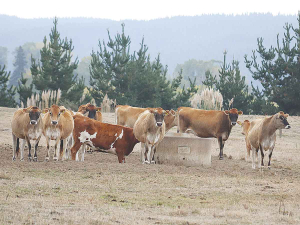Hawke’s Bay sheep and beef farmers warned to monitor stock water wells
Sheep and beef farmers in Hawke's Bay are being urged to keep a close eye on the wells that supply water to their stock.
 Water tables are very low, meaning wells and bores have dried up and farmers are trucking in water and feed.
Water tables are very low, meaning wells and bores have dried up and farmers are trucking in water and feed.
The drought in western parts of the North Island is reaching crisis point with many farmers from Northland to Taranaki having to truck in water and feed for their stock at great expense.
As Rural News goes to press, many areas have had as little as 30% of the rainfall they would normally receive at this time of the year, causing aquifer levels to drop, forcing farmers, where they can, to drill new deeper wells.
Ministry for Primary Industries (MPI) director of on-farm support, Dr John Roche, says there's been no appreciable rain since the drought declarations were made a month ago.
"The situation is especially bad in the southwest of Northland south of the Hokianga but there are other places in Northland very dry as well," Roche told Rural News.
"The situation is similar with the Waikato - King Country and certainly Taranaki.
"The whole western seaboard of the North Island is very dry," he says.
Roche says the situation is compounded by the fact that there is no 'drought busting' rain forecast. At the same time soil and air temperatures are dropping and the window for growing grass is declining.
In most regions, Roche says there are places where the ground is rock solid, making re-grassing difficult if not impossible.
He says it raises the issue of the need for more water storage because the climate is getting hotter and drier. He says his team is linking up with various regional advisory groups as well as B+LNZ, DairyNZ, Federated Farmers and the Rural Support Trust to provide help to farmers. This involves running social events to get farmers off farm as well as seminards and, if required, one on one discussions for individual farmers.
"We are guided by regions and if they say they need more support, we'll do more," he says.
Boon for Kumara
While dairy and red meat farmers are struggling with the drought in Northland, kumara growers aren't complaining.
Warwick Simpson who has 40ha of land in Dargaville says the dry conditions are making harvesting easier. He says this is because the kumara are dry and coming out of the ground nice and clean. He says the only potential problem is that the vegetables could get damaged coming out of the hard ground.
"But that is a minor, not a major issue," he says.
Simpson says if it was wet right nmow, harvesting the kumara crop could be difficult. He says for a start, the kumara would have mud attached to it and if it's really wet it would be difficult to get a machine in to get them out of the ground.
He says the present dry conditions will not affect the growth of the kumara.
South Island dairy farmers will soon be able to supply organic milk to Fonterra.
Norwood has announced the opening of a new Tasman dealership at Richmond near Nelson next month.
Buying or building a rural or semi-rural property? Make sure you know where the wastewater goes, says Environment Canterbury.
With collars on more than seven million cows worldwide, Nedap says its standalone launch into New Zealand represents world-leading, reliable and proven smart technology solutions for dairy farmers.
Entries have opened for the 2026 Fieldays Innovation Awards.
Animal welfare is of paramount importance to New Zealand's dairy industry, with consumers increasingly interested in how food is produced, not just the quality of the final product.

OPINION: Meanwhile, red blooded Northland politician Matua Shane Jones has provided one of the most telling quotes of the year…
OPINION: This old mutt has been around for a few years now and it seems these ‘once in 100-year’ weather…